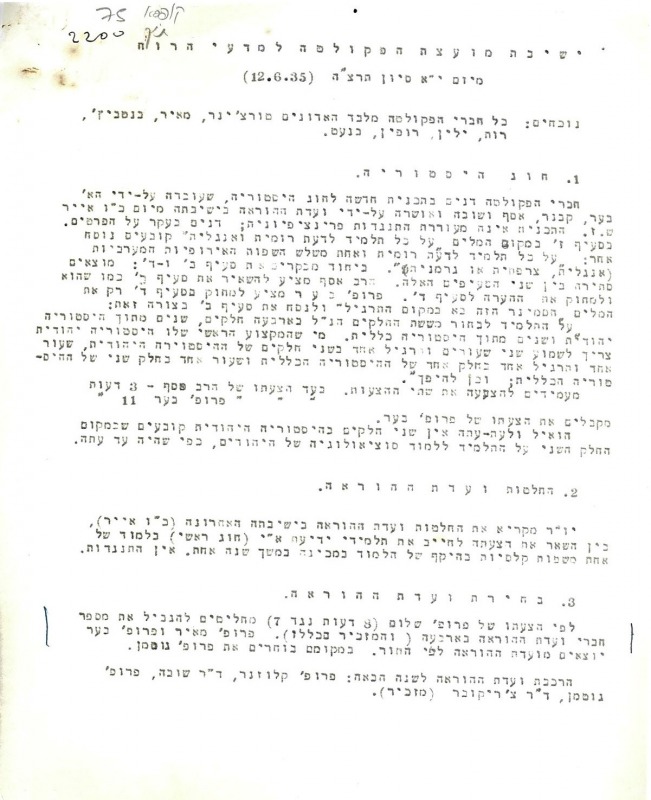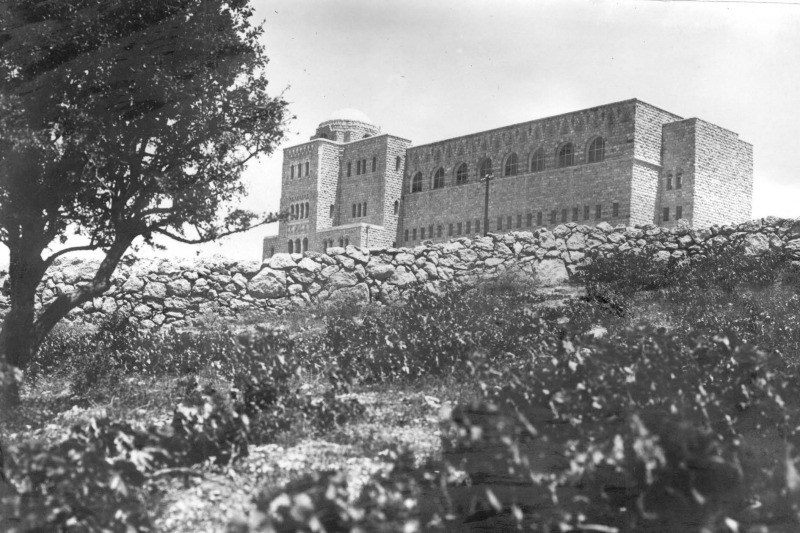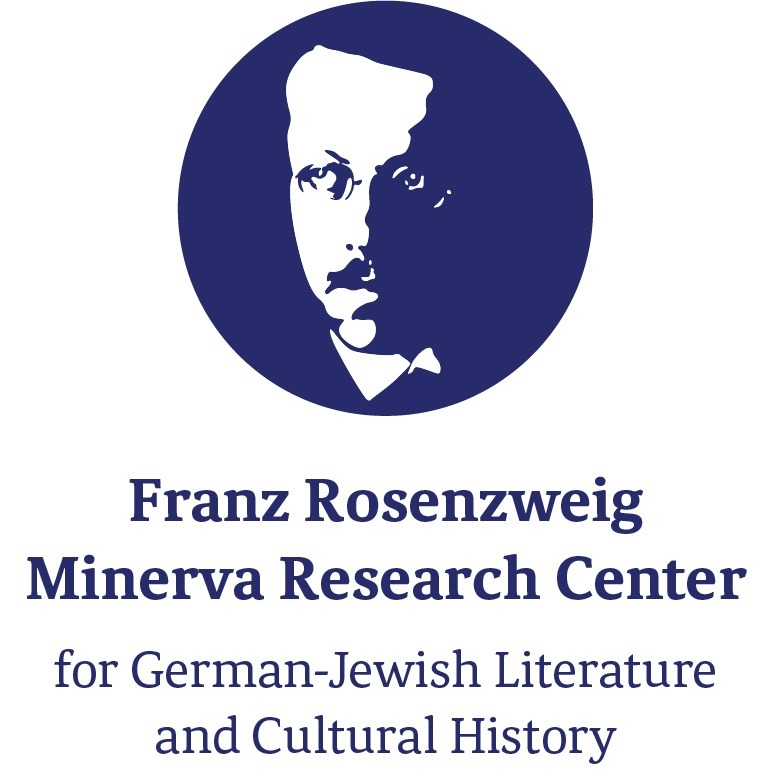By Tom Eshed and Netta Ehrlich, 20 January 2017
[עברית למטה]
The establishment of the History department in 1935 sheds light on very important issues connected to debates from the early days of the Hebrew University and to the importance of the teaching of history. Of particular significance are the differences between General History and the History of the Jewish People, as well as the requirements to learn in the new department.
On 12th June 1935 the Humanities Faculty Council at the Hebrew University passed a historic resolution. With a majority of eleven against the opposition of three it was decided to establish two new departments: the department of General History and the department for the History of the Jewish People. Until then there was only the Institute for Jewish Studies, which was concerned, among other things, also with the history of the Jewish People. Although the Council approved the resolution "without any fundamental opposition," this does not mean that there was no fierce debate on the subject. The main discussion related to the question whether to open a new department for the history of the Jewish People that would also deal with General history, or to establish two separate departments. One of the main opponents against the possibility of a separate department for General History was David Yellin. According to Yellin, “whoever studies Jewish History should acquire a broader historical education also in General history", but he also argued against the possibility that "our students will only have a superficial knowledge of Jewish History […] General history should be connected to Jewish History and not vice versa […] We need both General and Jewish history, but whoever wants to specialise in Jewish History needs to find a place in a Jewish university". Prof. Joseph Klausner expressed his opposition to the plan by claiming that it was "an attempt to eliminate the Institute of Jewish Studies […] General Studies must not absorb Jewish Studies". The opponents to the plan feared that the new department of General History would swallow up the Institute of Jewish Studies and harm the importance of Jewish history at the University. On the contrary, Prof. Yitzhak Baer argued that "We want to provide the students with a new worldview based on the study both of General and Jewish History. […] It is true that it means to be familiar with a great corpus of knowledge, but we can find a way to prevent this danger without eliminating the program itself". At the end a compromise was reached with the establishment of two separate departments – Jewish History and History – that exist up until today.

(מתוך: ארכיון האוניברסיטה העברית / From the Hebrew University Archive)
What kind of courses could a beginner take at the new department of History? First of all, he had to study Latin and at least one Western European language. In addiction to that, those who decided to specialise in ancient history needed to brush up also their knowledge of Greek. Today the situation is different and the department does not require to learn a language nor to know foreign languages in advance. Requirement of fluent knowledge in foreign languages may also shed light on the nature of scholarly research at the beginning of 20th century. Teaching was based on memorisation and on a philological approach, and required the profound knowledge of a vast corpus of texts. Today humanities tend to privilege critical thinking. Teachers often do not aim to provide a certain corpus of knowledge, but rather to teach research methodology and foster critique. The same is true as research is concerned, and perhaps because of that the demand for previous knowledge and for fluency in many foreign languages lost importance.
Another document from the University Archives informs us on the admission exams for the Department of History. The students were requested to describe the Persian Wars, the War between Rome and Carthage, the feudal regime, the causes for the rise of the Ottoman Empire, the reasons behind the formulation of the Peace of Augsburg, the doctrine of natural rights, etc. The only question related to a modern topic dealt with the geopolitical changes that followed the "last" (i.e. the first) World War. Most of the questions were general historical questions, and only one makes actual reference to the 20th Century, probably under the conviction that the World War brought far-reaching changes.
A comparison with the current study of history at the Hebrew University shows that nowadays most of the themes from the 1935 admission exams belong to the category of "Antiquity and the Middle Ages". Courses at the History department focus today precisely on modern age as well as on modern and postmodern issues. Admission exams, which do no exist anymore, provide us with a glimpse on the life of new students, who were required to have a complete and profound knowledge in general history. Today we witness a trend towards a concentration on specific issues, a sort of historical specialisation, and this trend requires critical theories rather than empirical data. This is partly due to the influence of the "Annales School", which turned the attention of historical research to the everyday life of common people, i.e. to social and cultural history, trying to understand the sequence of historical events in a long-term frame.
The intergenerational gap between contemporary historians and the founders of the History department might be explained as a result of the profound changes in the availability of information. While in the past there was a crucial need to collect information, today information is widely accessible. The nature of historical research might move thus towards areas that previously had been considered "not historical", such as culture critique and memory, as well as a tendency to interdisciplinarity.
על הקמת החוגים להיסטוריה
מאת תום אשד ונטע ארליך, 20 בינואר 2017
עם הקמת החוג להיסטוריה בשנת 1935 עלו כמה סוגיות מעניינות שאפשר ללמוד מהן על לבטי העבר ועל דגשי הלימוד בתחום ההיסטוריה, למשל ההבדלים בין היסטוריה כללית להיסטוריה של עם ישראל ודרישות הכניסה לחוג החדש.
ב-12.06.1935 קיבלה מועצת הפקולטה למדעי הרוח באוניברסיטה העברית החלטה היסטורית. ברוב של 11 תומכים מול שלושה מתנגדים הוחלט כי יוקמו באוניברסיטה שני חוגים חדשים: החוג להיסטוריה כללית והחוג להיסטוריה של עם ישראל. עד אז פעל באוניברסיטה רק המכון למדעי היהדות, שעסק בין השאר בהיסטוריה של העם היהודי. ההחלטה התקבלה במועצה "בלי התנגדות פרינציפיונית", אך אין זה אומר שלא התקיימו דיונים סוערים בנושא קודם לכן. הדיון המרכזי נסוב סביב השאלה אם יש לפתוח חוג ללימוד היסטוריה של עם ישראל שיעסוק גם בלימודי היסטוריה רחבה יותר, או שיש מקום לקיומם של שני חוגים נפרדים באוניברסיטה. אחד המתנגדים הראשיים להצעה לפתוח חוג נפרד להיסטוריה כללית במנותק מהיסטוריה יהודית, היה דוד ילין; ילין טען כי "מי שלומד היסטוריה יהודית צריך לרכוש לו השכלה היסטורית רחבה גם בהיסטוריה כללית, אבל הוא מתנגד לכך שלתלמידים שלנו יהיה מושג-מה מההיסטוריה היהודית רק כלאחר יד... צריך לצרף את ההיסטוריה הכללית אל ההיסטוריה היהודית ולא להיפך... לנו נחוצים שני הדברים – היסטוריה כללית והיסטוריה יהודית, אך מי שירצה להתמחות בהיסטוריה היהודית צריך שימצא לזה מקום במכללה היהודית". דעה חריפה יותר הביע פרופ' יוסף קלוזנר שטען כי התכנית היא "ניסיון לבטל את המכון למדעי היהדות... אסור להבליע את הלימודים העבריים בתוך הכלליים". כלומר, המתנגדים לתכנית חששו כי החוג החדש להיסטוריה כללית יבלע את המכון למדעי היהדות ויפגע בחשיבות הלימוד של ההיסטוריה של העם היהודי באוניברסיטה. לעומתם טען פרופ' יצחק בער כי "אנו רוצים לתת לתלמיד השקפת עולם חדשה, שתיבנה על לימוד ההיסטוריה הכללית והעברית גם יחד... נכון הדבר שהחומר מרובה הוא, אבל אפשר למצוא דרכים להימלט מסכנה זו מבלי לבטל את התכנית עצמה". כאמור, לבסוף נמצאה פשרה בין הצדדים בהקמתם של שני חוגים נפרדים, שקיימים עד עצם היום הזה.
לאיזה סוג לימודים יכול היה הסטודנט החדש לצפות בחוג הטרי להיסטוריה? ראשית, היה עליו ללמוד לטינית ולפחות שפה אירופית מערבית אחת. מי שהחליט להתמחות בהיסטוריה עתיקה נאלץ גם לשפשף את יכולותיו ביוונית. היום, לעומת זאת, אין בחוג למעשה חובה ללמוד שפה או לדעת שפות זרות מראש. ההכרח שבידיעת שפות זרות על בוריין עשוי ללמד אותנו גם על אופי המחקר שהתבצע בראשית המאה העשרים. ייתכן שסגנון הלימוד היה מושתת על שינון ושאופי המחקר נטה לפילולוגיה והצריך היכרות מעמיקה עם מגוון רחב של טקסטים; ואילו היום הלימודים ההומניים באוניברסיטאות מתמקדים בחשיבה ביקורתית. במהלך הלימודים המרצים לא יסתפקו בהנחלת ידע, אלא ילמדו גם מתודולוגיות מחקר ויעודדו ביקורת. כך גם במחקר, ואולי משום כך הצורך בידיעת שפות רבות והצורך בידע מוקדם איבדו מחשיבותם.

(מתוך: ארכיון האוניברסיטה העברית / From the Hebrew University Archive)
בין החומרים בארכיון האוניברסיטה נמצאת גם תעודה שחושפת בפנינו את מבחני הכניסה לחוג להיסטוריה. בבחינות אלו נדרש התלמיד לתאר את מלחמות הפרסים, את המלחמה בין רומא לקרתגו, את המשטר הפאודלי, את נסיבות עלייתה של האימפריה העות'מאנית, את נסיבות ניסוחו של שלום אוגסבורג, את תורת הזכויות הטבעיות ועוד. השאלה היחידה שדנה בנושא מודרני מבקשת להסביר את השינויים הגיאופוליטיים שנוצרו בעקבות מלחמת העולם "האחרונה". אפשר לראות כי רוב השאלות הן שאלות קלאסיות של לימוד היסטוריה, שאלות "רנסנסיות", ורק שאלה אחת עוסקת במאה העשרים, ככל הנראה מתוך הבנה שמלחמת העולם הביאה לתמורות מרחיקות לכת. אם נשווה זאת ללימודי ההיסטוריה היום נמצא שהקורסים העוסקים בשאלות שנשאלו במבחני הכניסה מ-1935 כלולים כעת במקבץ "העת העתיקה וימי הביניים" – קטגוריה מצומצמת הן מבחינת היקף המחקר הן מבחינת נקודות הזכות בהשוואה למקבץ "העת החדשה המוקדמת והעת החדשה המאוחרת". במילים אחרות, הלימודים בחוג להיסטוריה היום מתמקדים דווקא בעת החדשה ובנושאים מודרניים ופוסט-מודרניים. מבחני הכניסה להיסטוריה, שאינם קיימים עוד, נותנים לנו הצצה לחיי הסטודנט המתחיל, שנדרשה ממנו היכרות מלאה של ההיסטוריה באופן רוחבי. היום אנו עדים למגמת הצטמצמות לנושאים ספציפיים, מעין התמקצעות היסטורית, ולמגמה שדורשת חשיבה תיאורטית יותר מאשר ידיעה קונקרטית של ההיסטוריה. מגמות אלו הן בין השאר תוצאה של אסכולת האנאל (L'École des Annales) ששאפה למחקר היסטורי מעמיק על אודות חיי היומיום של האנשים הפשוטים, כלומר להיסטוריה חברתית ותרבותית שמבקשת להבין באופן שלם את השתלשלות האירועים בהיסטוריה במסגרת ארוכת טווח.
את הפער הבין-דורי בין ההיסטוריונים של היום ובין דור המייסדים של החוג אפשר להבין גם כתוצאה של השינויים העצומים בזמינות המידע: בעבר הודגש הצורך בצבירת מידע, ואילו היום המידע נגיש לכול; לכן אופיו של המחקר ההיסטורי גולש לתחומים שאולי נחשבו בעבר לא-היסטוריים כמו ביקורת תרבות, זיכרון ונטייה לאינטרדיסציפלינריות.

